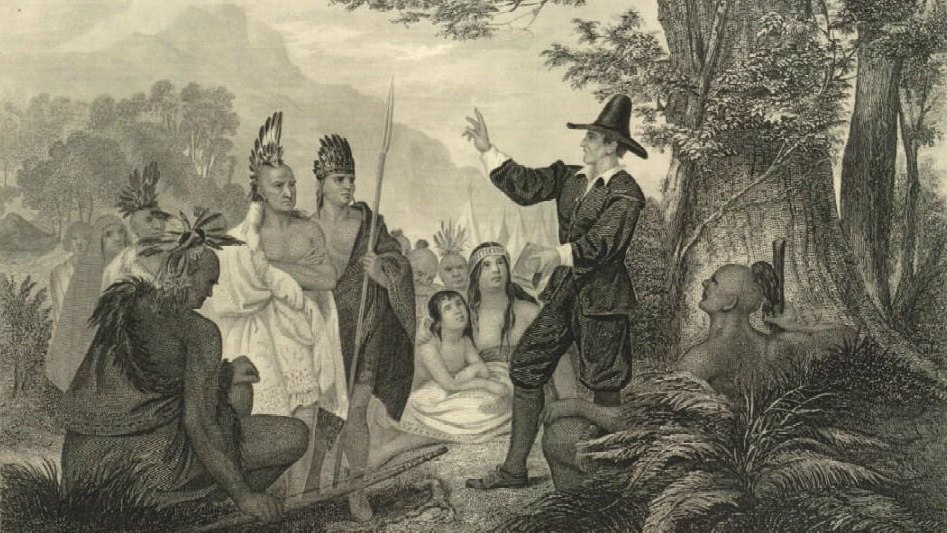Eliot labored in New England as a minister to the colonial population, but he was simultaneously engaged in equipping Native Christians for evangelistic outreach to other Indians. At age 67, he published a small book, with a long title, Indian Dialogues, for Their Instruction in that great Service of Christ, in calling home their Country-men to the Knowledge of God, and of Themselves, and of Jesus Christ.
The book presents an all-Indian cast on a wilderness stage, with the Native Christian settlement of Natick—the first “praying town”—portrayed as a model community, a hub for sending out evangelistic forays by Native Christians, and a place of pilgrimage for Native enquirers into the Christian life. In this fascinating book, we find many of Eliot’s responses to a diverse set of objections, misunderstandings, and clarifying questions that he and other evangelists encountered from both Native enquirers and Native critics of Christianity.
In Indian Dialogues, the Native evangelists exhibit what Richard Baxter called the quintessential work of an evangelist: pointing others to the “amiable excellencies of God.” Both Baxter and Eliot believed that the essence of evangelism is to persuade and call unconverted persons to admire God forever as their Creator, Redeemer, and Lord.
God’s Mercy and Grace
One of the conversations of Indian Dialogues concludes with a Native named Peneovot confessing his sinfulness to the Christian Waban: “The greatness of God’s majesty and power, against whom I—a finite poor worm—sinned, doth most amaze me. I pray help me further to understand the great majesty of God.” A bit later in the narrative, Waban tells Peneovot, “True, no creature is able to deliver us. Vain is the help of man or angel…. None but God himself can do it, and your heart will yield that God himself can do it.”
A bit later again in the story, Peneovot tells Waban, “Your discourse doth heighten my admiration.” Peneovot claims now to recognize
the wonderful things of God’s law, and of my eternal condemnation by it, my helpless and hopeless condition that I was in. And then, that the Lord should open unto me a possibility of escape, that a ransom and remedy might be found by the infinite wisdom and mercy of God. And that Jesus Christ had not only accomplished that great work, but offered the fruit and benefit of it to me, and called me to rest in him, and to betrust my soul with him for pardon of all my sins, and for eternal life in Jesus Christ.
Peneovot goes on to say that “these things are a matter of my admiration, and shall be to all eternity. My life remaining shall be spent in admiring and in obeying and suffering, as you have now taught me.” He then notes how Christ “did not forbear to offer [his] precious life for me” and resolves, “I will, by his grace assisting, admire at this mercy forever.”
Awakened to God’s Word
In the third dialogue, after a Christian named William concludes some teaching about the nature of the Bible and its importance for the Christian way of life, the still unconverted sachem Philip says, “Your discourse doth breed in my heart an admiration at that excellent book.”
Similarly, a seeker named Penitent tells the Christian John Speene, “My soul admires to see the great use that is to be made of the Word of God, which doth engage my soul more and more, to the frequent use of the Scriptures.” From the Bible, Penitent has learned of his sin, God’s wrath, and the refuge available to his soul in Jesus Christ. He is “filled with an abhorrence of myself, and wonderment of God’s patience, to suffer such a wretch as I am to live.”
Near the end of the book, a converted Penitent testifies, “I now am happy being united with Christ. Oh blessed change! I am in admiration at this. I admire the grace of God to a dead, lost, damned sinner. I am come into a new world.” A bit later still, the newly Christian Penitent aspires aloud, “I would to God that all my people were as I am, and tasted and felt what I have found. But that is not yet so. I desire to bring them to be the Lord’s people.”
God’s Wisdom and Works
Years later, in a longer book on the sufferings of Christ, Eliot urged Native and New English readers to admire the wisdom and works of God. The “infinite wise and merciful” providence of God is to be admired, even “adored,” he said.
This seemed especially true for Eliot concerning events that were initial disappointments or seeming defeats, but then were eventually appreciated for what good came of them. The death of Christ is the epitome of this kind of divine irony. Regarding the sealing of Christ’s tomb with a large stone and the stationing of soldiers to guard it, Eliot wrote, “But herein we may behold the admirable wisdom of God, and folly of man, that the very way which they took to prevent his Resurrection, was a means to make his Resurrection most evident and manifest unto all; the Watchmen were witnesses of it.”
Throughout the book, Eliot posed various aspects of the nature and activities of Jesus for the reader’s admiration. The hypostatic union of “God and man in one person,” Jesus Christ, was a “mystery eternally to be admired.” The wisdom and obedience of Jesus at age 12 was, said Eliot, “an admirable specimen of the grace of God in him.” The young Jesus’s ability to answer questions of “Doctors” and “Scholars” in the temple was admirable. The adult Jesus was “an admirable Example of patience, diligence, faithfulness, and self-denyal, that spared not his own body, though full of infirmities, to do good to others, and to do and suffer what God called him to do and suffer.”
The Lamb of God
The book’s penultimate chapter concludes Eliot’s copious survey of Christ’s suffering. After noting that Jesus was “obedient unto death,” Eliot concludes the final section of that chapter with this exclamation:
The Lamb of God is slain, the Sacrifice for sin is offered and accepted; Isaac is sacrificed… not only in will and purpose, as Abraham, and Isaac did, but in real performance. This hath God the Father, and God the Son performed for our sakes, to redeem and save us. Admire! Admire! Admire! Unto all eternity admire!
What a delightful duty—what a light and marvelous burden it is to admire our triune God. May he grant us today to steadily grow in joyful admiration of all that he is and has accomplished for us in Christ Jesus. May he captivate our hearts more and more while opening our mouths to tell of his majesty and his “amiable” ways. Oh, come let us adore him!
This article was originally posted on Desiring God December 5, 2016. Used by permission.




